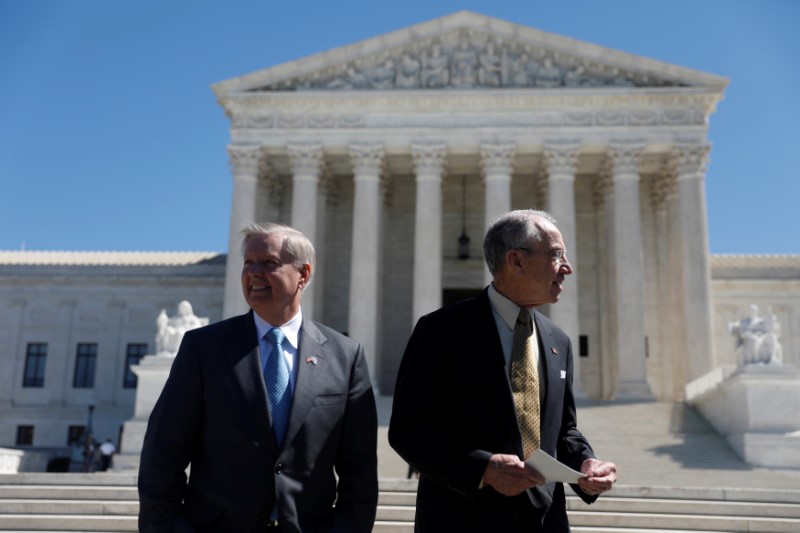By Mark Hosenball
WASHINGTON (Reuters) - Two senior Republican U.S. Senators on Friday called for a criminal investigation into the former British spy who compiled a "dossier" in 2016 of allegations of financial and personal links between then-presidential candidate Donald Trump, his advisers and Russia.
Senators Chuck Grassley and Lindsey Graham, who respectively chair the Senate Judiciary Committee and one of its subcommittees, sent a letter to FBI Director Christopher Wray and U.S. Deputy Attorney General Rod Rosenstein in which they said former spy Christopher Steele made "false statements" about his sharing information in the dossier with U.S. media outlets.
Grassley and Graham are supporters of a campaign by President Trump and some Republicans to demonize Steele and his dossier and cast doubt over the credibility of official U.S. investigations, including one led by Special Counsel Robert Mueller. The probes are looking into allegations that Russia meddled in the 2016 U.S. election to help Republican Trump. Moscow denies interference and Trump denies any collusion.
In the letter released by the senators, Grassley and Graham neither identify anyone to whom they believed Steele lied nor do they identify any news outlet. The letter makes reference to a "Top Secret" memo that they said relates to "certain communications between Christopher Steele and multiple U.S. news outlets" regarding the "dossier."
Steele had no immediate comment.
After Trump won the Republican nomination in July 2016, backers of Democratic Party presidential candidate Hillary Clinton started financing Steele's work via Washington research firm Fusion GPS. The firm had also worked on "opposition research" for one of Trump's opponents in the Republican primary.
In an emailed comment, Joshua Levy, a lawyer for Fusion GPS, suggested that the senators' letter was an effort to undermine the special counsel's investigation.
"After a year of investigations into Donald Trump's ties to Russia, the only person Republicans seek to accuse of wrongdoing is one who reported on these matters to law enforcement in the first place," Levy said. "We should all be skeptical in the extreme."
Although several news organizations, including Reuters, were briefed on Steele’s dossier before the November 2016 election, most decided not to report on the material because its inflammatory and sometimes salacious content could not be verified.
Congressional panels, including the Senate Intelligence Committee, set out to investigate U.S. intelligence agency allegations that Russia conducted a campaign of hacking and disinformation to undermine U.S. democracy in the election, but some of the bipartisanship has eroded. Graham, Grassley and some other Republicans have used official resources to investigate the Steele dossier, Trump critics and officials working for the Federal Bureau of Investigation and Mueller.
Two Trump campaign associates, former national security adviser Michael Flynn and aide George Papadopoulos have pleaded guilty to lying to the FBI in Mueller's probe.
U.S. Senator Richard Blumenthal, a Democrat, on Friday criticized the Republicans' letter.
"This action was taken without any bipartisan cooperation, or even consultation," Blumenthal said in a statement. "These vaguely stated, secret allegations seem designed more to distract attention from the priority issues for investigation, and discredit the FBI and other law enforcement."

The Democratic senator said it was "indisputable fact" that the probe of Russian meddling in the election and any possible Trump campaign role "was triggered by information completely independent from the dossier."